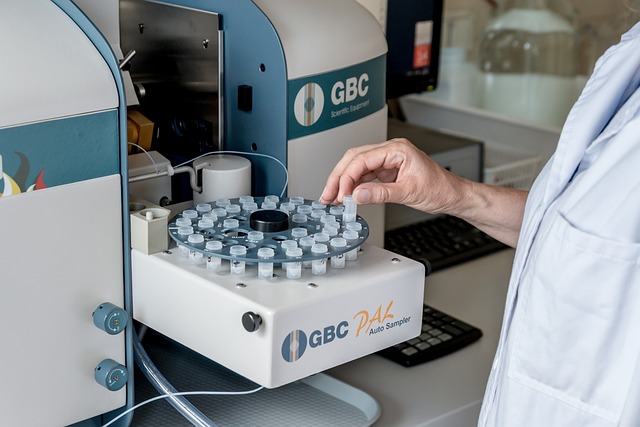Diagnosing Iron Deficiency in the UK begins with a Standard Liver Blood Test (SLBT) that measures ferritin levels, a protein crucial for iron storage. Low ferritin readings indicate insufficient iron reserves and can lead to anemia, prompting tailored treatments like dietary changes or supplements. Healthcare professionals interpret these results to accurately diagnose and address iron-related health concerns.
“Discover how ferritin level testing is a crucial tool in diagnosing iron deficiency, a common but often overlooked health issue. This comprehensive guide explores the role of ferritin—a protein storing iron—and its significance in maintaining optimal health. We delve into how standard liver blood tests in the UK can reveal iron deficiency, providing valuable insights for accurate diagnosis and treatment. Understand the implications of ferritin levels and take control of your well-being.”
- Understanding Ferritin and Its Role in Iron Deficiency
- How Standard Liver Blood Tests in the UK Can Help Diagnose Iron Deficiency
- Interpretating Ferritin Levels: What Does It Mean for Your Health?
Understanding Ferritin and Its Role in Iron Deficiency
Ferritin is a protein that plays a crucial role in iron storage and regulation within the body. It acts as a reserve for iron, ensuring it’s readily available when needed. In the context of Iron Deficiency, understanding ferritin levels becomes essential. When the body lacks sufficient iron, ferritin stores are depleted, leading to low ferritin levels in the blood.
A Standard Liver Blood Test (SLBT) UK often includes measurements of ferritin as part of its routine assessment. This test is valuable because it can indicate the presence and severity of Iron Deficiency. Low ferritin readings suggest insufficient iron stores, potentially pointing towards deficiency. By interpreting these results alongside other diagnostic tools, healthcare professionals can accurately diagnose and address Iron Deficiency, thereby promoting optimal health.
How Standard Liver Blood Tests in the UK Can Help Diagnose Iron Deficiency
In the UK, diagnosing iron deficiency often involves a comprehensive approach, and standard liver blood tests play a pivotal role in this process. These routine assessments go beyond measuring basic liver function; they include indicators like ferritin levels, which are crucial for identifying potential iron deficiencies. Ferritin, a protein that stores and transports iron in the body, is a key marker. Low ferritin levels can signal an underlying iron deficiency, as the body may be unable to adequately absorb or utilize iron from dietary sources.
The Standard Liver Blood Test in the UK typically includes measurements of various enzymes, proteins, and other markers, providing valuable insights into liver health and functionality. When a patient presents with symptoms suggestive of iron deficiency, such as fatigue, pale skin, or shortness of breath, healthcare professionals can use these blood tests to assess ferritin levels. If found to be low, further investigation may be warranted to confirm the diagnosis and determine the severity of the deficiency, guiding appropriate treatment interventions.
Interpretating Ferritin Levels: What Does It Mean for Your Health?
Ferritin levels, often measured through a standard liver blood test UK, provide crucial insights into your body’s iron storage capacity. A ferritin test is particularly important when diagnosing iron deficiency, as low ferritin levels can indicate inadequate iron reserves. In the context of health, interpreting these results is essential. If your ferritin level is below the normal range, it suggests that your body may not have enough iron stored, potentially leading to iron-deficiency anaemia.
Understanding your ferritin levels helps healthcare professionals assess whether you need treatment for iron deficiency. This could involve dietary changes or supplements to increase iron intake and improve overall health. Conversely, elevated ferritin levels can also be significant, indicating potential inflammation or other health issues that require further investigation.
Ferritin level testing, alongside standard liver blood tests in the UK, offers a crucial tool in diagnosing iron deficiency. By understanding ferritin’s role and interpreting its levels, healthcare professionals can effectively identify and manage this common nutritional deficit. These insights enable targeted interventions to enhance iron status and overall health outcomes.
